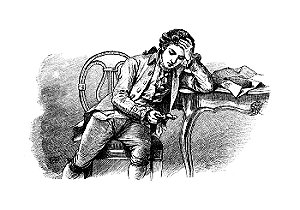The Sorrows of Young Werther (30) by J.W. von Goethe
 The Sorrows of Young Werther (30) by J.W. von Goethe ♦ AUGUST 21. ♦ In vain do I stretch out my arms toward her when I awaken in the morning from my weary slumbers. In vain do I seek for her at night in my bed, when some innocent dream has happily deceived me, and placed her near me in the fields, when I have seized her hand and covered it with countless kisses. And when I feel for her in the half confusion of sleep, with the happy sense that she is near, tears flow from my oppressed heart; and, bereft of all comfort, I weep over my future woes.
The Sorrows of Young Werther (30) by J.W. von Goethe ♦ AUGUST 21. ♦ In vain do I stretch out my arms toward her when I awaken in the morning from my weary slumbers. In vain do I seek for her at night in my bed, when some innocent dream has happily deceived me, and placed her near me in the fields, when I have seized her hand and covered it with countless kisses. And when I feel for her in the half confusion of sleep, with the happy sense that she is near, tears flow from my oppressed heart; and, bereft of all comfort, I weep over my future woes.
♦ AUGUST 22. ♦ What a misfortune, Wilhelm! My active spirits have degenerated into contented indolence. I cannot be idle, and yet I am unable to set to work. I cannot think: I have no longer any feeling for the beauties of nature, and books are distasteful to me. Once we give ourselves up, we are totally lost. Many a time and oft I wish I were a common labourer; that, awakening in the morning, I might have but one prospect, one pursuit,  one hope, for the day which has dawned. I often envy Albert when I see him buried in a heap of papers and parchments, and I fancy I should be happy were I in his place. Often impressed with this feeling I have been on the point of writing to you and to the minister, for the appointment at the embassy, which you think I might obtain. I believe I might procure it. The minister has long shown a regard for me, and has frequently urged me to seek employment. It is the business of an hour only. Now and then the fable of the horse recurs to me. Weary of liberty, he suffered himself to be saddled and bridled, and was ridden to death for his pains. I know not what to determine upon. For is not this anxiety for change the consequence of that restless spirit which would pursue me equally in every situation of life?
one hope, for the day which has dawned. I often envy Albert when I see him buried in a heap of papers and parchments, and I fancy I should be happy were I in his place. Often impressed with this feeling I have been on the point of writing to you and to the minister, for the appointment at the embassy, which you think I might obtain. I believe I might procure it. The minister has long shown a regard for me, and has frequently urged me to seek employment. It is the business of an hour only. Now and then the fable of the horse recurs to me. Weary of liberty, he suffered himself to be saddled and bridled, and was ridden to death for his pains. I know not what to determine upon. For is not this anxiety for change the consequence of that restless spirit which would pursue me equally in every situation of life?
The Sorrows of Young Werther (Die Leiden des jungen Werther) by J.W. von Goethe. Translated by R.D. Boylan
To be continued
fleursdumal.nl magazine for art & literature
More in: -Die Leiden des jungen Werther, Goethe, Johann Wolfgang von

